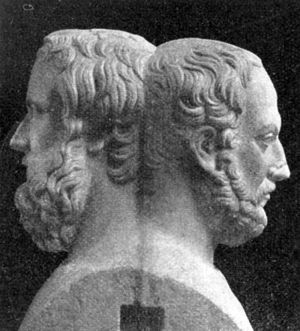Downton Abbey, Herodotus and Truth
It all began with a conversation, an article in The Atlantic, and Downton Abbey. At Christmas, James, a history education major, and I were discussing history and like Pilate we asked, “What is truth?” Can we know the truth of history by stating dates and facts? Is it possible that when we have assembled our skeleton of factual history we are unable to get the thing right like the blind men describing the parts of an elephant? Could it be there is more truth in the sometimes not-quite-correct stories from history rather than from just-the-facts?
Classical educators are well aware of this controversy. It all began with Herodotus, that debunked teller of tales. A man who thought that “custom was king,” that what we needed from history was a guide to moral choices. Not too many years later the seeds of modernity were planted in the historian Thucydides, that politico of war and stratagems. The Peloponnesian War is no Iliad, its strategy is not balanced with story.
After our conversation James sent me a link to Robert D Kaplan’s 2007 defense of Herodotus in The Atlantic:
“If we have learned anything during this age of speedier and increasingly numerous interactions between peoples with different historical experiences, it is that facts matter less than perceptions, especially perceptions informed by raw emotions. It is what people believe that is crucial, not what they actually know. What is needed, therefore, beyond guiding philosophical principles, is a vivid appreciation of just what’s out there, in the form of the myths, passions, and irrationalities that in any age are central to decision making and, in a larger sense, to the human spirit itself. Romance, rather than being antithetical to realism, is a necessary component of it.”
Enter Downton Abbey and a renewed interest in World War I: Herodotus in the form of the lovely men of Oxford against Thucydides and the machine of war. You could almost say that WWI was Herodotus’s last stand. The Proud Tower of classical education, western civilization, and ordered society was falling in Britain but before it fell it left us with a body of romantic history unrivaled since a blind poet listened to his muse.
Paul Fussell has written a history of WWI, The Great War and Modern Memory, which is a perfect balance of fact and romance. Fussell often uses those famous Oxford (etc.) poets to illustrate the facts of WWI in his respected history. Fussell’s history can remind Christian classical educators, who have been enjoying Downton Abbey, why stories are the flesh of history.
By all the glories of the day
And the cool evening’s benison,
By the last sunset touch that lay
Upon the hills when day was done,
By beauty lavishly outpoured
And blessings carelessly received,
By all the days that I have lived
Make me a soldier, Lord.
(William Noel Hodgson)
Robert D Kaplan ends his article with an apology for the marriage of fact to romance:
“It would be naive to think that our world is not, in its own way, just as fantastic, just as unreasonable. Given the adversaries we have fought, and are likely to fight still; given the mirages that cloud our own judgment about distant places about which we think we know much, but in fact know little; given all of that, the dreamlike delusions and psychoses revealed in the stories of Herodotus provide a richer insight into what we are up against than does much contemporary analysis. Coping with the world of the coming decades will require an arresting imagination. Leaders who cannot mentally escape their own narrow slots of existence will fail. Herodotus will be as valuable as Thucydides.”
Where is the truth of history? Most moderns would confidently affirm that truth is not found in romance and yet, the facts without romance can never supply it either. Sadly, we are more likely to be deceived by facts and never even know what hit us, than by story. World War I is a great place to start untangling ourselves, for the sake of our children.













